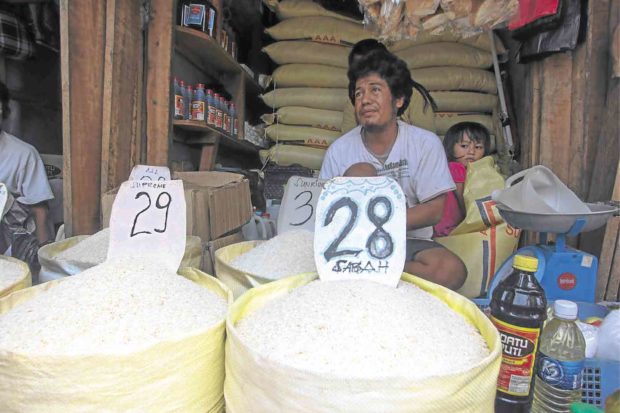
SHOPKEEPERS in the public market of Bongao, capital of the island province of Tawi-Tawi, sell goods, including rice, mostly imported from Sabah in Malaysia. KARLOS MANLUPIG/INQUIRER MINDANAO
ZAMBOANGA CITY—Prices of basic commodities in Sulu and Tawi-Tawi have increased the past weeks as traders in the two island-provinces are forced to buy supplies from sources other than Sabah, where goods are cheaper, according to three nongovernment organizations (NGOs).
The groups Lupah Sug Bangsamoro Women Association, Tulung Lupah Sug Inc. and Tarbilang Foundation Inc. said in a statement that the national government might have to intervene to convince Kuala Lumpur to lift the blockade it enforced in its borders with the Philippines.
The Malaysian Navy started the blockade last month following kidnappings perpetrated by the Abu Sayyaf. As a result, Sulu and Tawi-Tawi traders going to Sabah have been denied entry by the Malaysian Navy.
Sabah is the common marketplace for Sulu and Tawi-Tawi businessmen as goods are cheaper there.
“Food prices in Tawi-Tawi and Sulu have soared, creating a potential humanitarian crisis, as Sabah remains closed to traders from the Sulu archipelago, more than a month after its border gates were drawn in the wake of Abu Sayyaf abductions of Malaysian sailors,” the three NGOs said in the statement.
Octavio Dinampo, executive director of the Tulung Lupah Sug Inc., said the blockade had triggered sharp increases in the prices of rice, sugar, flour, cooking oil and noodles.
The price of a 25-kilogram sack of rice is now P1,100 from P625 prior to the blockade. Sugar now sells for P2,900 per 50-kg sack from P1,600 a few weeks ago. Cooking oil now sells for P80 per liter from P60 per liter. Noodles are now being sold at P56 per kilogram from just P30 in April, according to Dinampo.
“We appeal to the Malaysian government to reopen Sabah to traders from the Sulu archipelago,” said the NGOs’ statement.
Dinampo said unless traders were allowed inside Sabah, a food crisis could hit Sulu and Tawi-Tawi.
The national government, he said, “must provide urgent and targeted food aid to poor and vulnerable communities as an interim measure.”
He said tougher security measures should be taken by the Philippine government to put a stop to the kidnappings.
Gov. Mujiv Hataman of the Autonomous Region in Muslim Mindanao (ARMM) said he had sent teams from the regional government to assess the situation in the two provinces.
Lawyer Laisa Alamia, ARMM executive secretary, said as early as April, officials had been monitoring the movement of prices of basic commodities in Sulu, Tawi-Tawi and even Basilan, which are known to have been importing a significant volume of prime commodities from Sabah.
She said the ARMM government had also asked the National Food Authority to ensure that rice was available in the three island provinces at regular prices that should range from P600 to P650 per 25-kg sack.
“We will work with the national government to reopen the border for trading,” she said. Julie Alipala, Inquirer Mindanao